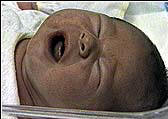![]()
BodyBark-clad monster guards Senegal circumcision rite
Reuters, U.S.A., By Rose Skelton, Friday, November 4, 2005
ZIGUINCHOR, Senegal (Reuters) - Dressed head-to-toe in a costume of deep red tree bark and with a large knife in each hand, the monster-like figure turns the corner of a quiet street, screeches and strides after a group of fleeing women.
Trampling plastic buckets beneath its oversized bark-clad feet, it slashes at wooden market stalls where minutes before vendors were lazily swatting flies from piles of fish.
Petrified children cry and women scream as they flee the "Kankouran," a mysterious figure believed to be endowed with special powers who appears in the villages of Senegal's southern Casamance region during annual circumcision rites.
During the August-November rainy season, young boys are circumcised during elaborate three-week ceremonies celebrated by the Manding people of Casamance. Celebrants dressed as the Kankouran play a key role in these rites.
"In Africa, there are things that we believe in and one of them is that there are bad spirits who want to harm the child while he's going through this vulnerable period. The Kankouran is working against that," said Ibrahima Ndiongue, 72, speaking outside his home in Ziguinchor, Casamance's regional capital.
The Manding believe that the Kankouran wards off evil spirits, or djinn, that threaten the boys during their passage to manhood. But the monster-like creature also inspires fear.
"There's not so much danger from the Kankouran here because we are in the town," says Tapha Ndiongue, 27, Ibrahima's son.
"But when you go to the villages of Casamance, if you hear the Kankouran coming, you go to your house and close it up. People who do not respect the Kankouran can be killed."
WANING MYSTERY
Although Casamance, separated from the rest of mainly Muslim Senegal by finger-shaped Gambia, remains the heartland of the West African country's mystical traditions, some fear these are being eroded by the spread of television and Internet.
"In the real Manding country, the women couldn't look at the Kankouran," said the elder Ndiongue proudly, lamenting the past when the figure inspired both greater fear and fascination.
"Back then, you would see a Kankouran in the coconut tree, and when you ran and looked again, it was in another. But nowadays, these kids do whatever they like."
Despite the intrusion of the modern world, mystery and exclusion still envelop some aspects of the all-male circumcision tradition.
Circumcision of women was banned in Senegal in 1999.
Traditionally, boys were taken to the forest and taught by male elders the wisdom needed to be a man. Today, the circumcised boys are kept at home in a special room until their period of healing is finished. During this time, they must not set eyes on a woman or a non-circumcised boy.
Toward the end of the healing process, men gather at the boy's house one night to sing and dance to the rhythm of the serouba, a small wooden drum hung around the neck and beaten with an acacia branch.
Before dawn, they walk to a sacred forest and the boy is prepared for life as an adult in a series of rites that remain a secret to all but those who witness them.
SACRED WATER
The final act in the boy's life as a child is to be washed in sacred water found in the forest.
"Once you have been washed in the forest, you are considered a man," says Fara Ndiaye, who traveled 300 miles to Ziguinchor for his nephew's circumcision ceremony.
As the sun pours through thick forest foliage and mist clears, several Kankouran emerge screeching from the bushes for the final act of guardianship to the boy, now deemed an adult.
In the sweltering heat, the entourage of elaborately dressed dancers and drummers walk from the forest to the boy's house, singing the traditional songs reserved only for men.
When the procession meets a party of women coming the other way, the crowd scatters before a charging Kankouran. Superstition has it that anyone who discusses this sacred male rite with a woman will fall it.
But for some, the Kankouran no longer instills fear.
Sitting outside her crumbling house, 30-year-old Rama Ndiaye laughs at the women and children fleeing the bark-clad figure.
"Before you couldn't even look at the Kankouran," she says. "But there are no more secrets here any more."

Pediatricians turn away from circumcision
The United States is the only country that routinely circumcises baby boys for non-religious reasons
CNN, U.S.A.
March 1, 1999
ATLANTA (CNN) -- American pediatricians are turning away from the practice of routine circumcision, concluding that doctors have no good medical reason to perform the procedure.
The United States is the only country in the world that routinely removes the foreskins of infant boys. Critics of circumcision got additional ammunition Monday from the American Academy of Pediatrics, a leading medical organization.
The academy concluded the benefits "are not compelling enough" for circumcision to be routinely administered.

A newborn winces in pain after a circumcision
Monday's statement, published in the March edition of the journal Pediatrics, was the academy's first in 10 years on the practice. But in recent years, medical societies in Canada, Britain and Australia have come out in opposition to routine circumcision.
Critics have long contended that removing the foreskin from the penis is traumatic, medically unnecessary and may reduce sexual pleasure later in life. As one critic, Dr. George Denniston, put it: "Who are we to question mother nature?"
Canadian researchers, whose study was published in this week's Journal of the American Medical Association, studied the heart rates and crying patterns of babies during different stages of circumcision.
In fact, in the study they found the babies suffered so much trauma that they stopped the study part way through.
The results were so compelling that they took the unusual step of stopping the study before it was scheduled to end rather than subjecting any Read More ..bies to circumcision.
One baby stopped breathing for 25 seconds from the trauma of having part of his foreskin severed. Read More ..
![]()
Baby Dies of Herpes in Ritual Circumcision By Orthodox Jews
ABC News, U.S.A., by Susan Donaldson James, March 12, 2012
New York City is investigating the death last September of a baby who contracted herpes after a "ritual circumcision with oral suction," in an ultra-Orthodox Jewish ceremony known in Hebrew as metzitzah b'peh.
The district attorney's office in Kings County Brooklyn is investigating the death of the 2-week-old baby at Maimonides Hospital, but would not disclose the name of the mohel or whether there would be a prosecution.
The 5,000-year-old religious practice is seen primarily in ultra-Orthodox and some orthodox communities and has caused an alarm among city health officials. In 2003 and 2004, three babies, including a set of twins, were infected with Type 1 herpes; the cases were linked to circumcision, and one boy died.
The mohel who performed the procedures, Yitzchok Fischer, was later banned from doing circumcisions, according to The New York Times. It is not known if he was involved in this recent death.
"It's certainly not something any of us recommend in the modern infection-control era," said Dr. William Schaffner, chair of preventive medicine at Vanderbilt University.
"This is a ritual of historic Abraham that's come down through the ages, and now it has met modern science," he said. "It was never a good idea, and there is a better way to do this." (The modern Jewish community uses a sterile aspiration device to clean the wound in a circumcision.)
In the 2004 death and the more recent one, a mohel infected the penile wounds with Type 1 herpes I (HSV-1), which affects the mouth and throat. It is different from Type 2 or genital herpes (HSV-2), which is a sexually transmitted disease and can cause deadly infections when a newborn passes through an infected birth canal.
Neonatal herpes is "almost always" a fatal infection, according to Schaffner. "It's a bad virus. [Infants] have no immunity and so it's a very serious illness. Now we have another death -- an unnecessary, incredibly tragic death."
![]()
Circumcision Botched by Jewish Father Results in Conviction for Aggravated Assault
The Canadian Press
Dec. 22, 2011
VANCOUVER - A B.C. man who performed a botched circumcision on his four-year-old son on the kitchen floor of his home has lost an appeal of his conviction and been found guilty of a more serious charge.
The B.C. Court of Appeal has stayed the man's conviction for criminal negligence causing bodily harm and convicted him of aggravated assault.
Court heard the boy was born premature at only 2.5 pounds and could not be circumcised at the time, nor did his parents request it.
South Korean Doctors
Male circumcision based on myths and misinformation
Peak age of circumcision of males in Korea is 12 years old!
UTIs are rare

"Of every 1,000 boys who are circumcised 2 will be admitted to hospital for a urinary tract infection (UTI) before they are one year old."
"Of every 1,000 boys who are not circumcised 7 will be admitted to hospital for a UTI before they are one year old. "

Sur 1 000 garçons circoncis 2 seront hospitalisés en raison d'une infection urinaire avant l'âge d'un an.
Sur 1 000 garçons non circoncis 7 seront hospitalisés par suite d'une infection urinaire avant l'âge d'un an.
CanadianCRC editor:
Anyone who states that urinary tract infections are common among newborn baby boys, and therefore
advocates that the genital mutilation of boys ( male circumcision) will stop urinary tract infections, is a liar or misinformed.
Besides, urinary tract infections are entirely treatable.
Men's News Daily Online
Commentary on the David Reimer botched circumcision / gender changed case
When Feminist Dogma Met Dr. Mengele
CanadianCRC editor's Note: Reminder about our policy: Many sides of an issue are expressed in articles on this website. Many articles contain points of view which should be heard but are not the position of the Canadian Children's Rights Council.
"..Circumcision May CAUSE Urinary Tract Infection"
Urinary Tract Infections (UTIs) are rare, and mainly occur in the first year of life. They are several times Read More .. common in girls than boys (but of course surgery is never considered for girls).
They are painful, and women's experience of them is a powerful inducement to have sons circumcised, if they imagine that this will protect them. In fact, a significant proportion of boys contract UTIs even though they are circumcised. A study in Israel found they mainly occurred in girls at four months, but in boys soon after they were circumcised.... Now an Australian study suggests circumcision may cause urinary problems. Read More ..
2003 British Medical Association Statement Against Circumcision
The BMA does not believe that parental preference alone constitutes sufficient grounds for performing a surgical procedure on a child unable to express his own view. . . . Parental preference must be weighed in terms of the child's interests. . . . The BMA considers that the evidence concerning health benefit from non-therapeutic circumcision is insufficient for this alone to be a justification for doing it. . . . Some doctors may wish to not perform circumcisions for reasons of conscience. Doctors are under no obligation to comply with a request to circumcise a child. Read More ..

